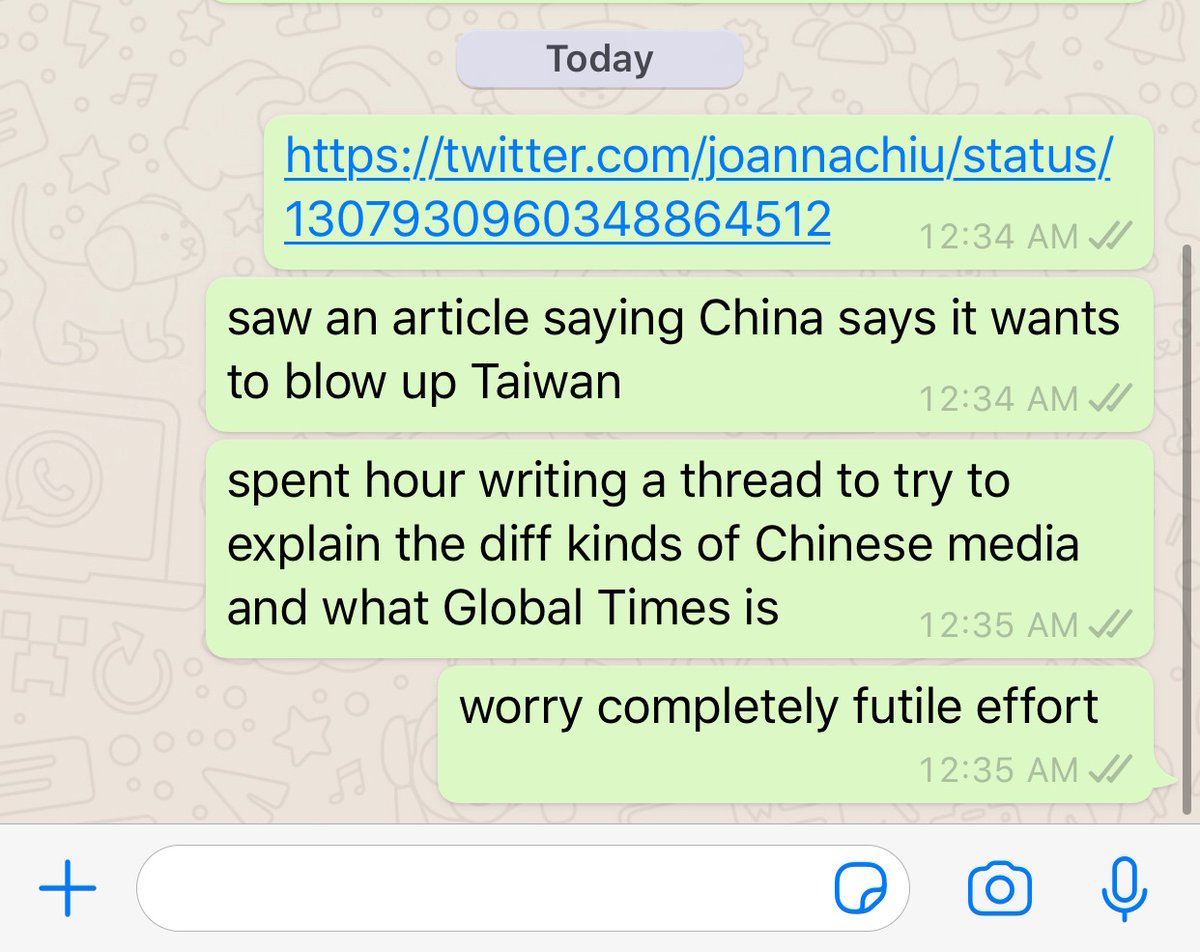Global Times is making the news for publishing a threat on the Taiwan president's life. Some important context here by @pingroma on the belligerent state-owned newspaper. It's not quite a direct mouthpiece of the Chinese Communist Party. qz.com/745577/inside-…
It's important to differentiate between China's "state-run" and "state-owned" media. I don't want to give an exhaustive list because my understanding may be outdated. Here's @ericfish85 on the extent to which the @globaltimesnews speaks for itself. foreignpolicy.com/2017/04/28/chi…
People's Daily newspaper, on the other hand (@PDChina) is definitely the Chinese Communist Party's official mouthpiece. scmp.com/tech/article/2…
Xinhua (@XHNews) is China's official news agency, publishing in multiple languages. But unlike big news wires headquartered in democratic countries, Xinhua is completely state-run and has zero editorial independence. Its stories reflect official policy. en.wikipedia.org/wiki/Xinhua_Ne…
Is there a detailed break-down of the different major Chinese news outlets? If so, please let me know because we should share such a guide widely.
There could be bad unintended consequences if people treat the often-absurd Global Times as literally the voice of Xi Jinping.
There could be bad unintended consequences if people treat the often-absurd Global Times as literally the voice of Xi Jinping.
Why is it important for people in the West to understand the differences between Chinese media outlets?
Well, for politicians in particular, security experts say it's pretty important they figure it out before speaking with any foreign media. Read: thestar.com/news/canada/20…
Well, for politicians in particular, security experts say it's pretty important they figure it out before speaking with any foreign media. Read: thestar.com/news/canada/20…
Al Richmond, a Canadian municipal-level politician, spoke with Xinhua on several occasions on topics like Huawei and Beijing's handling of the #COVID19 pandemic, then told me he was surprised by the way Xinhua presented his comments... thestar.com/news/canada/20…
On the other hand, when we lump all Chinese media together, we also miss out on some valuable journalism from outlets like @caixin. Twitter tags Caixin as "state-affiliated" media, but it's pretty much as independent as it gets (without being shut down). caixinglobal.com
And many China nerds would agree that many articles from the relatively new English online magazine @SixthTone are vital for understanding the fabric of Chinese society, particularly youth culture. But its parent company is a state-owned enterprise. sixthtone.com
I wouldn't know any of the above if I didn't live in Beijing as a correspondent. When China expels or detains/intimidates foreign journalists, it's targeting the people who can report most accurately and with the most nuance for international audiences. thestar.com/news/world/aus…
Most of my favourite journalists in China have been forced out of the country. For the many now reporting on China from outside the country, it's hard but we have to try to maintain contacts inside the country in order to report as accurately as possible. cbc.ca/news/world/chi…
That means taking responsibility for conveying nuance to readers, and not treating the Global Times as the mouthpiece for Beijing. In all likelihood, its ramblings are dominated by the ideas of this one dude @HuXijin_GT. You can read his tweets in English.
https://twitter.com/HuXijin_GT/status/1307900639557509120
And full disclosure: Global Times ran this rambling op-ed complaining about my interview with the former Canadian ambassador. It's not unusual for GT to rag on foreign journalists, and we typically don't take them as serious threats. globaltimes.cn/content/113732…
The recently reported detention of Australian journalist for Chinese state media @ChengLeiCGTN, and alarming treatment of Australian correspondents @MikeSmithAFR @billbirtles is something we should all be following carefully. The latest from @MJSCarney: abc.net.au/news/2020-09-2…
Follow the @fccchina on updates on the working conditions of foreign journalists in China. I used to do research for @pressfreedom and can vouch for their very stringent fact-checking standards for their reports on press freedom in China: cpj.org/asia/
Before I left Beijing, I worked on this 100-page guide to censorship on Chinese social media. The early sections contain detailed explanations of the Chinese media landscape and censorship regulations. And there are lots of case studies: pen.org/wp-content/upl…
The research here is mine, while the analysis and recommendations come from @penamerican editors: pen.org/research-resou…
Sigh... what I just texted a friend, so he can see how well I spent my time. So much for a pre-bedtime relaxation routine. 

• • •
Missing some Tweet in this thread? You can try to
force a refresh









